Back end Drupal developers are the backbone of your website's functionality and performance. They ensure that the server, application, and database communicate seamlessly, providing a robust and efficient user experience.
Back end development skills for Drupal include proficiency in PHP, SQL, and Drupal-specific technologies like Drush and Composer. Additionally, skills such as problem-solving, debugging, and understanding of web security are crucial for success in this role.
Candidates can write these abilities in their resumes, but you can’t verify them without on-the-job Back End Drupal Developer skill tests.
In this post, we will explore 7 essential Back End Drupal Developer skills, 7 secondary skills and how to assess them so you can make informed hiring decisions.
Table of contents
7 fundamental Back End Drupal Developer skills and traits
The best skills for Back End Drupal Developers include Drupal Development, PHP Programming, Database Management, API Integration, Version Control, Security Practices and Performance Optimization.
Let’s dive into the details by examining the 7 essential skills of a Back End Drupal Developer.
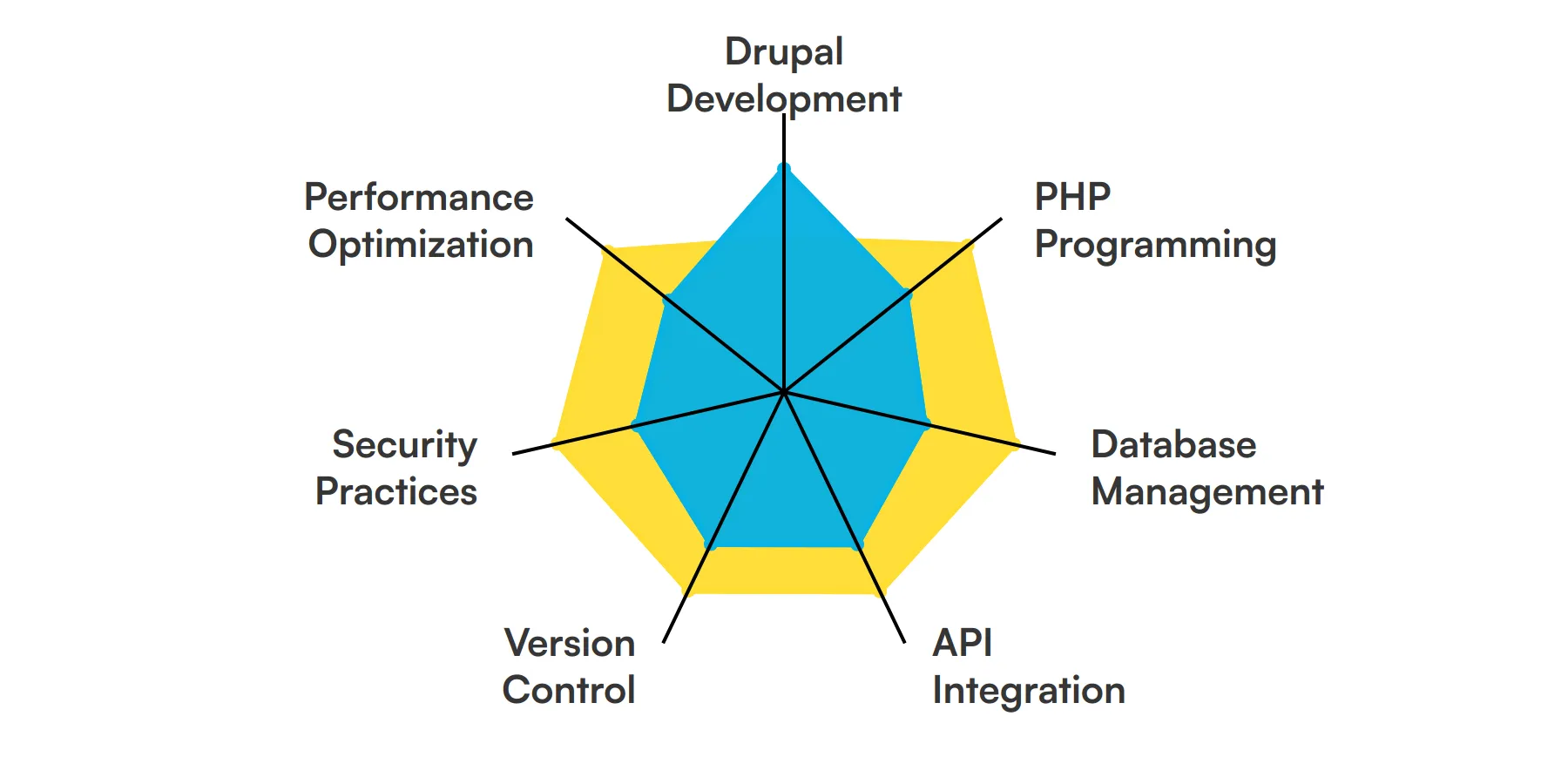
Drupal Development
A back end Drupal developer must be proficient in Drupal module development and theming. This skill involves understanding Drupal's core APIs and hook system to create or modify functionalities that meet the needs of the website.
For more insights, check out our guide to writing a Back End Drupal Developer Job Description.
PHP Programming
Since Drupal is built on PHP, a strong grasp of PHP is necessary for backend development. The developer uses PHP to write custom modules, automate tasks, and integrate with other systems, ensuring dynamic and interactive user experiences.
Database Management
Knowledge of database technologies, particularly MySQL, is essential for managing Drupal's data storage and retrieval. The role involves optimizing database queries and ensuring efficient data flow between the server and the application.
API Integration
Back end developers often need to integrate third-party APIs into Drupal. This skill requires understanding both Drupal's structure and the external APIs to seamlessly connect services like payment gateways or social media platforms.
Check out our guide for a comprehensive list of interview questions.
Version Control
Using version control systems like Git is crucial for managing changes to the project codebase. It allows the developer to track revisions, revert changes, and collaborate effectively with other team members.
Security Practices
Implementing and maintaining security measures to protect data and prevent vulnerabilities is a key responsibility. This includes regular updates, secure coding practices, and understanding common security threats in web applications.
For more insights, check out our guide to writing a Cyber Security Engineer Job Description.
Performance Optimization
The ability to analyze and improve the performance of the website is critical. This involves caching strategies, optimizing database interactions, and reducing server response times to enhance user satisfaction.
7 secondary Back End Drupal Developer skills and traits
The best skills for Back End Drupal Developers include Linux Administration, JavaScript, Testing and Debugging, Continuous Integration, UX/UI Principles, Agile Methodologies and Communication Skills.
Let’s dive into the details by examining the 7 secondary skills of a Back End Drupal Developer.
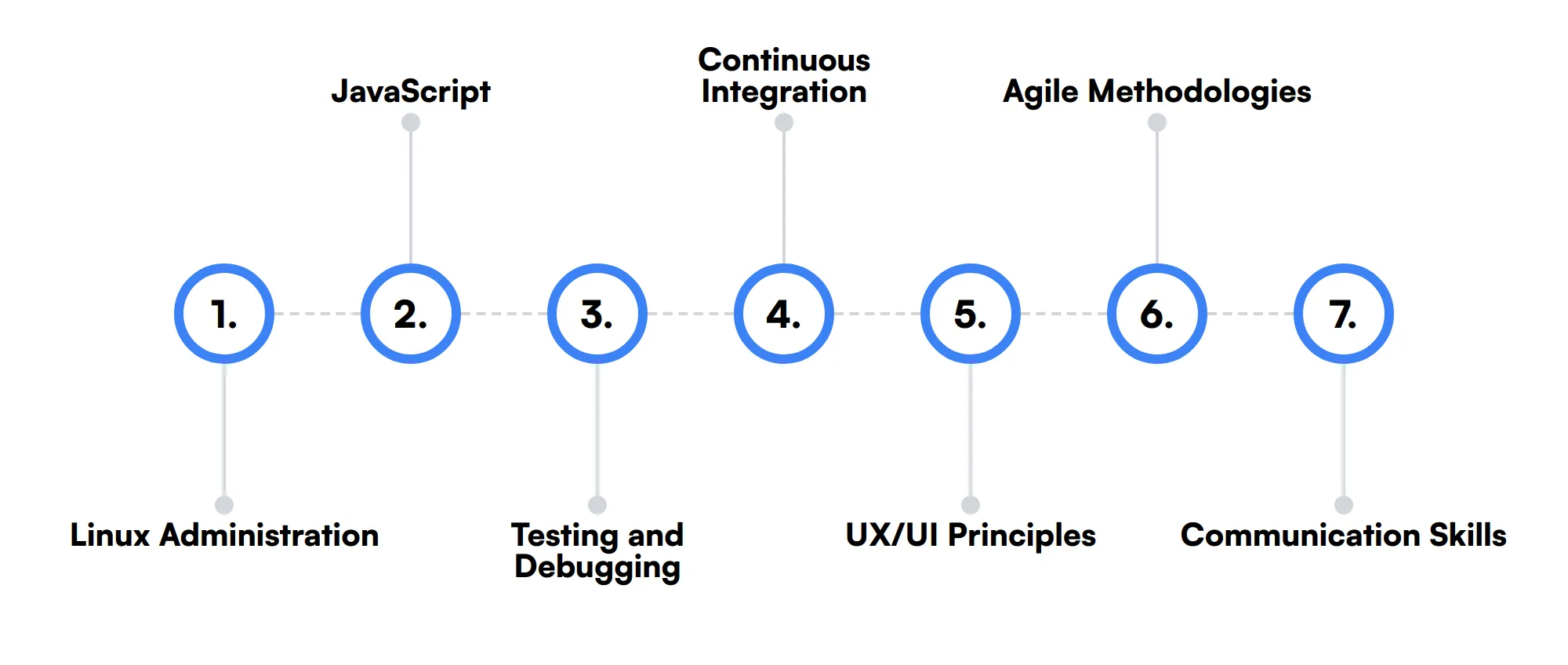
Linux Administration
Familiarity with Linux server environments can help in managing the servers where Drupal applications are hosted, including tasks like setting up the server, deploying applications, and configuring necessary services.
JavaScript
While primarily a back end skill set, understanding JavaScript and libraries like jQuery can be beneficial for a Drupal developer to handle occasional front-end interactions or to debug complex integrations.
Testing and Debugging
Skills in automated testing frameworks and debugging tools ensure that modules and integrations work as intended and meet quality standards before going live.
Continuous Integration
Experience with continuous integration tools helps in automating the testing and deployment processes, making the development cycle more efficient and less prone to errors.
UX/UI Principles
Understanding basic principles of user experience and user interface design can aid in making decisions that affect the front end, even though the primary focus is on back end development.
Agile Methodologies
Knowledge of Agile development practices supports the collaborative and iterative nature of professional software development, helping teams respond to unpredictability through incremental work cadences and empirical feedback.
Communication Skills
Effective communication is important for collaborating with team members and stakeholders, ensuring that requirements are understood and met throughout the development process.
How to assess Back End Drupal Developer skills and traits
Assessing the skills and traits of a Back End Drupal Developer can be a challenging task. While resumes and portfolios provide a snapshot of a candidate's experience, they often fall short in revealing the depth of their expertise in areas like Drupal Development, PHP Programming, and Database Management. To truly understand a candidate's capabilities, you need a more hands-on approach.
Skills-based assessments are an effective way to evaluate a candidate's proficiency in key areas such as API Integration, Version Control, Security Practices, and Performance Optimization. These assessments can help you identify whether a candidate has the practical knowledge and problem-solving abilities required for your specific needs. Adaface on-the-job skill tests can significantly streamline this process, offering a 2x improved quality of hires and an 85% reduction in screening time.
Let’s look at how to assess Back End Drupal Developer skills with these 5 talent assessments.
Drupal Online Test
Our Drupal Online Test evaluates a candidate's comprehensive knowledge in managing and developing websites using Drupal. It covers a wide range of skills from site building and theming to module development and site administration.
The test assesses candidates on their ability to configure and manage Drupal sites, develop custom modules, and ensure site security and performance optimization. It also includes a coding question to evaluate hands-on PHP programming skills.
Successful candidates demonstrate their ability to design scalable and maintainable web applications using Drupal, alongside strong PHP coding capabilities.
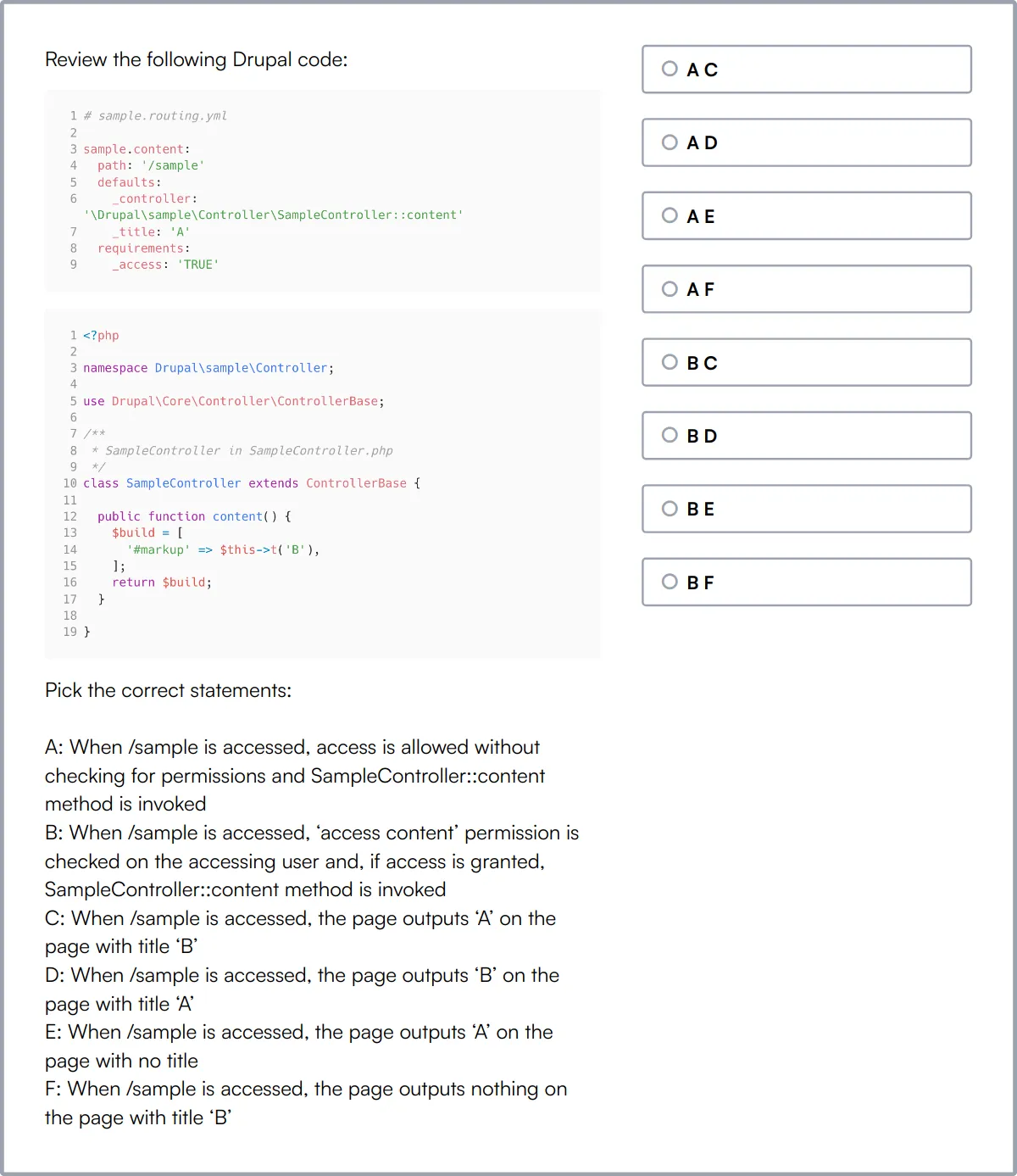
PHP Online Test
Our PHP Online Test targets a candidate's expertise in PHP programming, covering fundamentals, OOP concepts, and error handling techniques.
This test evaluates the structuring of PHP code using OOP techniques, handling server-side caching, and managing errors and exceptions effectively. It also challenges candidates with coding questions to test their practical PHP skills.
Candidates who score well are proficient in writing clean, optimized PHP code and demonstrate a strong understanding of PHP's core programming concepts.
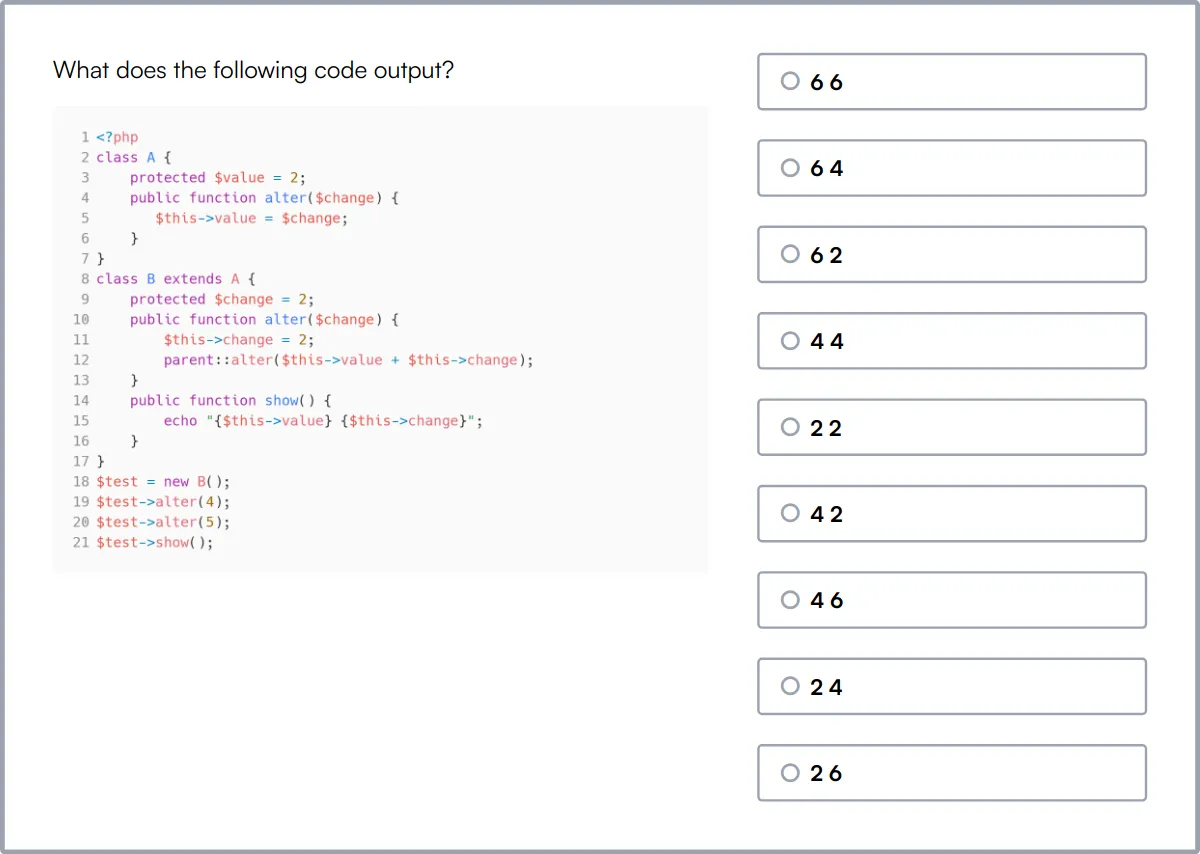
MySQL Online Test
Our MySQL Online Test assesses candidates on their proficiency with MySQL, focusing on SQL queries, database design, and data manipulation.
The test covers a range of database management skills including normalization, indexing, and the use of joins and transactions. It aims to evaluate a candidate's ability to efficiently design and query databases.
High-scoring candidates will show a deep understanding of database architecture and the ability to optimize database interactions.

REST API Test
Our REST API Test evaluates a candidate's understanding of RESTful APIs, focusing on API integration and backend service design.
The test examines knowledge of REST principles, HTTP methods, authentication processes, and best practices in API design. It includes a coding question to assess practical skills in creating and interacting with APIs.
Candidates excelling in this test demonstrate their capability to design and implement reliable RESTful services with proper understanding of web protocols and data formats.
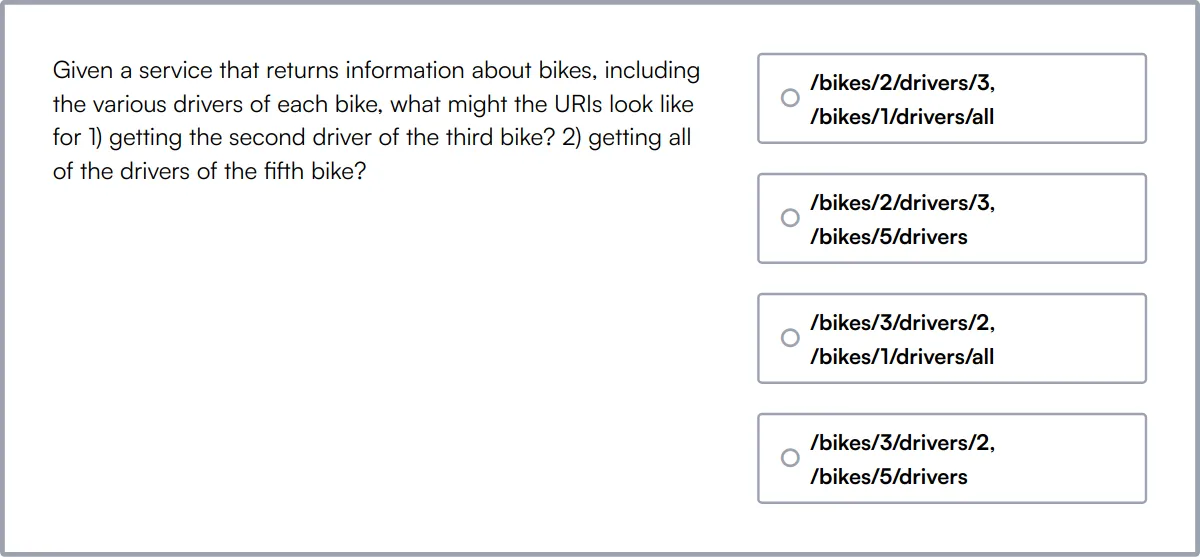
Git Online Test
Our Git Online Test measures a candidate's ability to use Git for version control, including branching, merging, and handling repositories.
This test evaluates the candidate's familiarity with Git commands, conflict resolution, and repository management. It is designed to assess how well a candidate can manage code versions in collaborative environments.
Proficient candidates will demonstrate a strong command of Git operations and best practices in version control necessary for maintaining code integrity and collaboration.
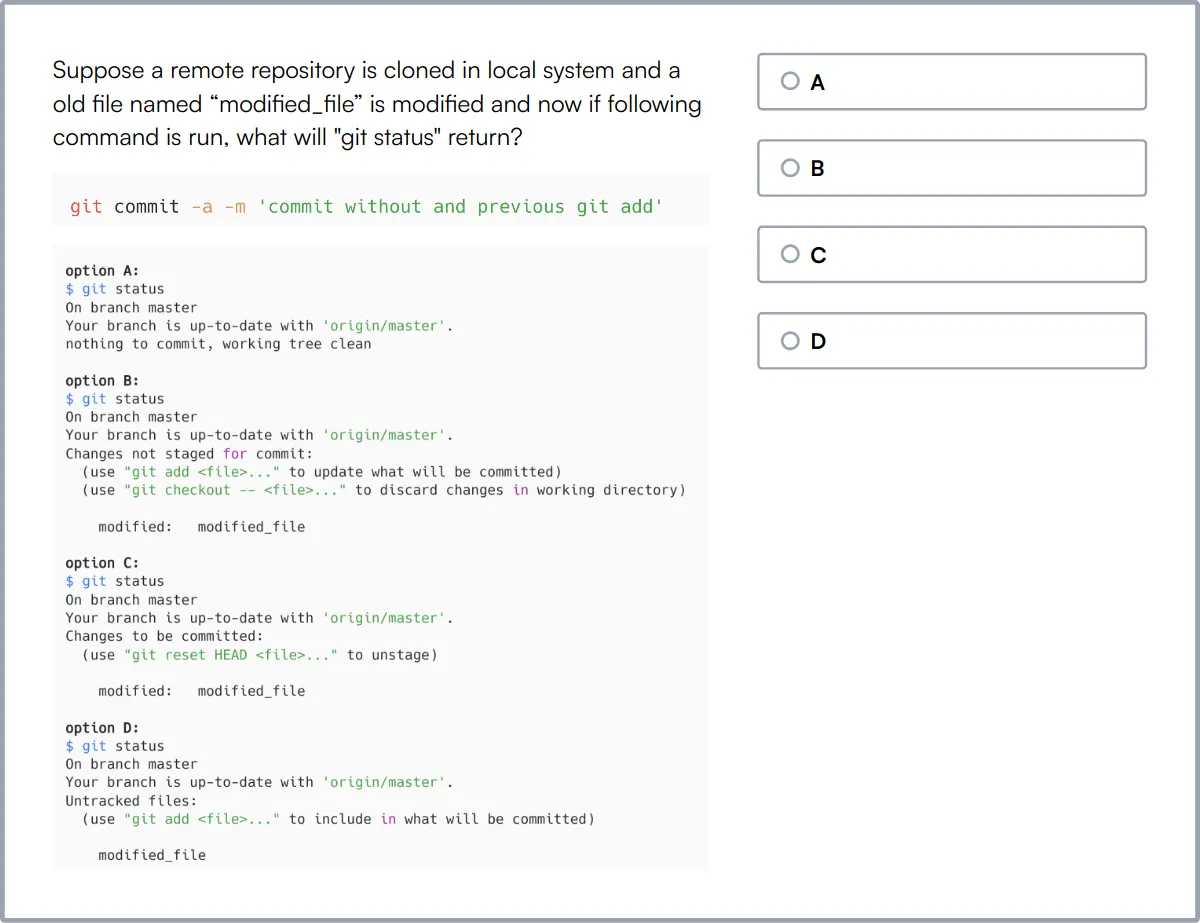
Summary: The 7 key Back End Drupal Developer skills and how to test for them
| Back End Drupal Developer skill | How to assess them |
|---|---|
| 1. Drupal Development | Evaluate expertise in custom module development and theming in Drupal. |
| 2. PHP Programming | Assess ability to write clean, maintainable, and effective PHP code. |
| 3. Database Management | Check proficiency in designing, querying, and maintaining databases. |
| 4. API Integration | Review skills in connecting and utilizing external and internal APIs. |
| 5. Version Control | Observe usage of tools like Git for source code management. |
| 6. Security Practices | Examine knowledge of securing applications against common vulnerabilities. |
| 7. Performance Optimization | Assess strategies for enhancing application speed and efficiency. |
NuxtJS Test
Back End Drupal Developer skills FAQs
What are the key skills required for a Back End Drupal Developer?
A Back End Drupal Developer should have skills in Drupal Development, PHP Programming, Database Management, API Integration, Version Control, Security Practices, and Performance Optimization.
How can I assess a candidate's Drupal Development skills?
You can assess Drupal Development skills by reviewing their past projects, asking for code samples, and conducting technical interviews focused on Drupal-specific tasks.
Why is PHP Programming important for a Back End Drupal Developer?
PHP is the primary language used in Drupal. Proficiency in PHP allows developers to create custom modules, themes, and perform complex integrations.
What should I look for in a candidate's Database Management skills?
Look for experience with SQL, database design, and optimization. Ask about their experience with MySQL or other databases commonly used with Drupal.
How do I evaluate a developer's API Integration capabilities?
Evaluate their experience with RESTful and SOAP APIs, their ability to integrate third-party services, and their understanding of JSON and XML data formats.
What version control systems should a Back End Drupal Developer be familiar with?
A Back End Drupal Developer should be familiar with Git, as it is widely used for version control in Drupal projects. Knowledge of platforms like GitHub or GitLab is also beneficial.
How important are Security Practices for a Back End Drupal Developer?
Security is critical in web development. Ensure the candidate understands common security vulnerabilities and best practices for securing Drupal sites.
What role does Linux Administration play in a Back End Drupal Developer's job?
Linux Administration skills are important for managing servers, deploying applications, and troubleshooting server-related issues in a Drupal environment.
Assess and hire the best Back End Drupal Developers with Adaface
Assessing and finding the best Back End Drupal Developer is quick and easy when you use talent assessments. You can check out our product tour, sign up for our free plan to see talent assessments in action or view the demo here:

40 min skill tests.
No trick questions.
Accurate shortlisting.
We make it easy for you to find the best candidates in your pipeline with a 40 min skills test.
Try for freeRelated posts



